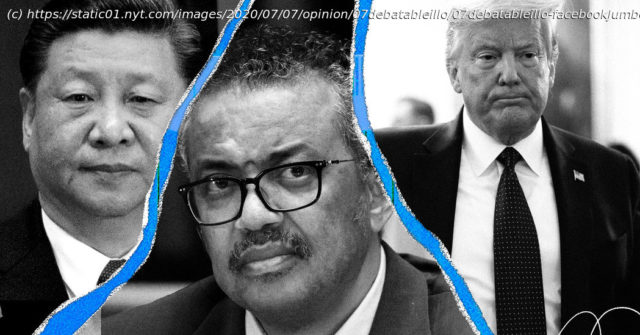President Trump is not its only problem.
On Tuesday, President Trump formally began the process of pulling the United States out of the World Health Organization, having accused the organization of not holding the Chinese government to account for its handling of the coronavirus.
The withdrawal would not go into effect until next July. But the prospect of losing the United States as a member, far and away the W. H. O.’s largest donor, is a big blow to the organization, and comes just a day after 239 scientists in 39 countries wrote an open letter claiming its guidance on airborne transmission was outdated.
Mr. Trump’s criticisms of the W. H. O. may be hypocritical, but many public-health experts and journalists say they are not entirely unfounded. What has the pandemic revealed about the organization’s shortcomings, and how can they be remedied? Here’s what people are saying.
The World Health Organization was founded as part of the United Nations in the wake of World War II, at the dawn of what some call Pax Americana, or the American Century. A product of that era’s heady faith in international cooperation, the W. H. O. stated as its founding objective “the attainment by all peoples of the highest possible level of health.” In practice, this broad mandate has translated to alerting the world to potential public-health threats, preventing the spread of diseases, and championing universal health care policy.
During emergencies like the coronavirus, the W. H. O. is meant to act as a coordinating body, employing its 7,000 workers spread over 150 offices worldwide to organize a global response, guide containment, declare emergencies and make recommendations in cooperation with member nations. If a vaccine is ever discovered for the coronavirus, the W. H. O. will play an important role in coordinating its distribution and influencing its pricing.
But the W. H. O. was never vested with any direct authority over its members, as my colleagues Daniel Victor and Christine Hauser explain, so its mission often exceeds its abilities. And like any governing body, the organization is subject to budgetary and political pressures, especially from powerful nations like the United States and China, as well as from private funders like the Gates Foundation.
The W. H. O.’s track record of responding to emergencies is uneven, The Times editorial board writes. While it boasts many momentous achievements — including the eradication of smallpox, the near eradication of polio, the development of an Ebola vaccine and a huge expansion of basic health care services in low-income countries — it also suffers from institutional sclerosis. The W. H. O.’s sluggish response to the West African Ebola outbreak in 2014 was primarily responsible for the severity of that epidemic, which killed 11,000 people in two years. According to ProPublica, the Obama administration was so displeased with the W. H. O. that it largely bypassed the agency to coordinate its Ebola response with other countries.
The W. H. O.’s communication about the evolving science of the virus had been drawing scrutiny well before this week.
The W. H. O. has been mired in political controversy, too,in large part because of its perceived deference to the Chinese government.
The timeline of the W. H. O.’s response matters because of the exponential nature of the coronavirus’s spread. In New York City, for example, researchers have estimated that acting even a week or two earlier might have reduced cases by 50 percent to 80 percent.






